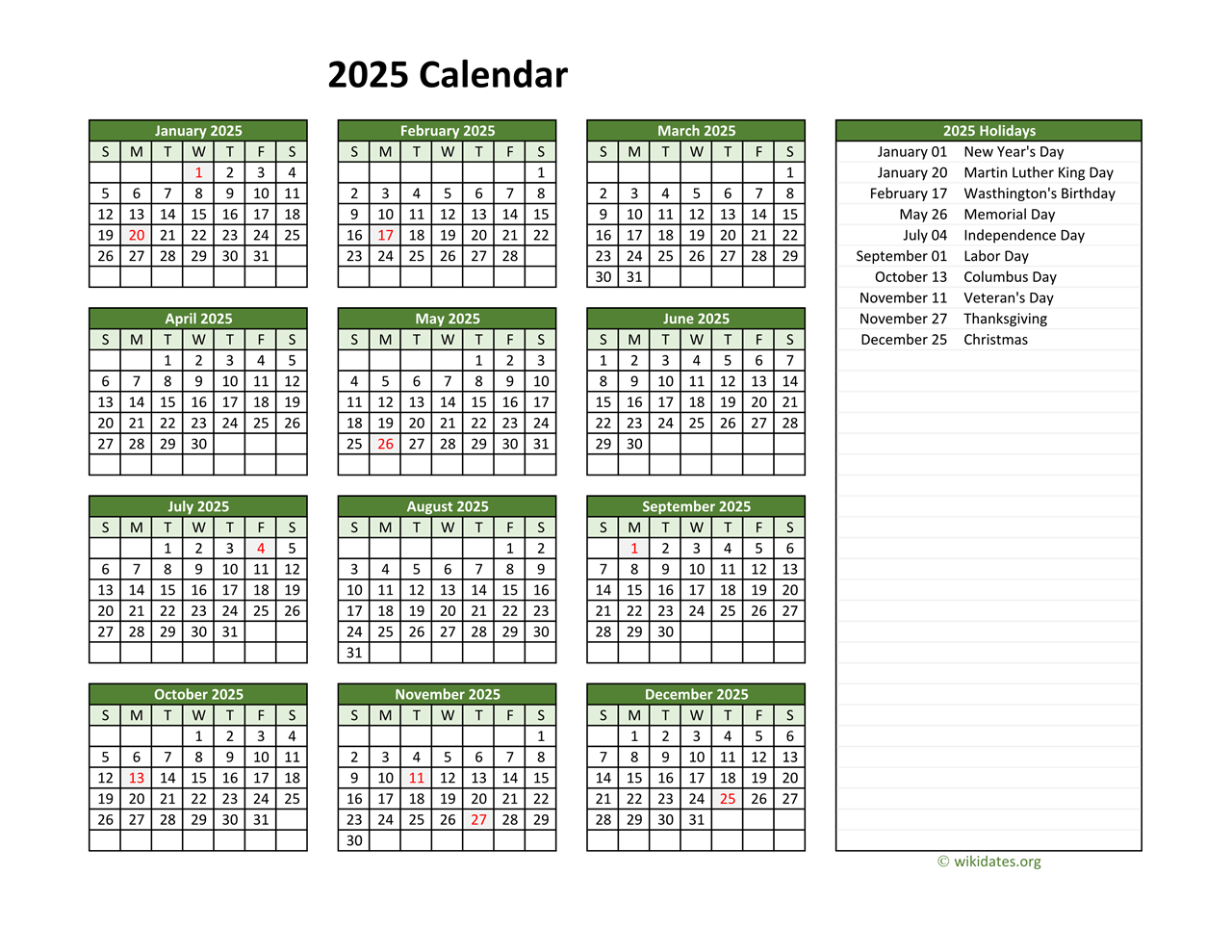Navigating the Calendar: A Guide to US Federal Holidays in 2025
Related Articles: Navigating the Calendar: A Guide to US Federal Holidays in 2025
Introduction
With great pleasure, we will explore the intriguing topic related to Navigating the Calendar: A Guide to US Federal Holidays in 2025. Let’s weave interesting information and offer fresh perspectives to the readers.
Table of Content
Navigating the Calendar: A Guide to US Federal Holidays in 2025

The United States observes a number of federal holidays each year, providing opportunities for reflection, celebration, and respite. These holidays are designated by federal law, impacting the operations of government agencies, financial markets, and many businesses. While the exact dates of some holidays may shift annually, the majority remain fixed on specific calendar days.
Here is a comprehensive overview of the federal holidays scheduled for 2025, outlining their historical significance, cultural impact, and practical implications:
January
- New Year’s Day (Wednesday, January 1): Marking the beginning of a new year, this holiday is an occasion for reflection, setting resolutions, and celebrating with family and friends.
February
- Presidents’ Day (Monday, February 17): Celebrated on the third Monday of February, this holiday honors the birthdays of George Washington and Abraham Lincoln, two pivotal figures in American history.
May
- Memorial Day (Monday, May 26): Observed on the last Monday of May, this day commemorates the sacrifices of American military personnel who died in service to their country. It is a time for remembering and honoring those who gave their lives in defense of freedom.
June
- Juneteenth National Independence Day (Friday, June 19): This holiday marks the emancipation of enslaved African Americans in the United States, commemorating the day in 1865 when Union soldiers arrived in Galveston, Texas, announcing the end of slavery. Juneteenth celebrates freedom, resilience, and the ongoing struggle for equality.
July
- Independence Day (Wednesday, July 4): This holiday celebrates the signing of the Declaration of Independence in 1776, marking the birth of the United States as a nation. Independence Day is a time for parades, fireworks, barbecues, and gatherings with friends and family.
September
- Labor Day (Monday, September 1): Celebrated on the first Monday of September, this holiday honors the contributions and achievements of American workers. It is a time to recognize the importance of labor in building and maintaining the nation’s economy and society.
October
- Columbus Day (Monday, October 13): Observed on the second Monday of October, this holiday commemorates the arrival of Christopher Columbus in the Americas in 1492. While the holiday has been a subject of debate and controversy due to its historical complexities and impact on indigenous populations, it continues to be observed in some states.
November
-
Veterans Day (Wednesday, November 11): Observed on November 11, this holiday honors all veterans of the United States Armed Forces. It is a time to express gratitude for their service and sacrifice in defending the nation’s security and freedom.
-
Thanksgiving Day (Thursday, November 27): This holiday, celebrated on the fourth Thursday of November, is a time for families and friends to gather and express gratitude for the blessings of the past year. It is traditionally marked by a large feast, often featuring turkey, stuffing, and other seasonal dishes.
December
- Christmas Day (Wednesday, December 25): This holiday celebrates the birth of Jesus Christ, a central figure in Christianity. It is a time for families and friends to gather, exchange gifts, and celebrate the spirit of giving and goodwill.
Understanding the Impact of Federal Holidays
Beyond their symbolic and cultural significance, US federal holidays have practical implications that affect various aspects of American life. These include:
-
Government Operations: Federal government offices, including agencies, courts, and postal services, are typically closed on federal holidays. This closure allows government employees to observe the holidays and ensures that essential services are not disrupted during these periods.
-
Financial Markets: Stock markets, bond markets, and other financial institutions typically close on federal holidays. This closure allows financial professionals to observe the holidays and ensures that market operations are not disrupted during these periods.
-
Business Operations: Many businesses, especially those that rely on government contracts or financial transactions, also close on federal holidays. This closure allows employees to observe the holidays and ensures that business operations are not disrupted during these periods.
-
School Schedules: Public schools and universities typically close on federal holidays, allowing students and faculty to observe the holidays and providing a break from academic routines.
-
Travel and Tourism: Federal holidays often see a surge in travel and tourism activity, as people take advantage of the time off to visit family and friends, explore new destinations, or simply relax and recharge.
Frequently Asked Questions (FAQs) about US Federal Holidays in 2025
Q: Are all federal holidays observed nationwide?
A: While most federal holidays are observed nationwide, some states and localities may have their own holidays or observe certain holidays differently. For example, some states observe Columbus Day as Indigenous Peoples’ Day.
Q: Are federal holidays always observed on the same day of the week?
A: Most federal holidays are fixed on specific calendar dates, such as New Year’s Day or Independence Day. However, some holidays, such as Presidents’ Day and Memorial Day, are observed on the third Monday of February and the last Monday of May, respectively. This means that the specific date of these holidays can vary from year to year.
Q: What are the implications of federal holidays for businesses?
A: Businesses that operate on a federal level or that rely on government contracts or financial transactions may be required to close on federal holidays. Additionally, businesses that operate in industries that are heavily influenced by travel and tourism, such as hotels, restaurants, and airlines, may see a surge in demand during federal holidays.
Q: What are some tips for planning around federal holidays?
A: When planning travel, business meetings, or other events, it is important to be aware of federal holidays and their potential impact on operations. This includes checking for potential closures, scheduling events accordingly, and making necessary arrangements for travel and accommodation.
Conclusion
The US federal holidays offer a rich tapestry of cultural and historical significance, providing opportunities for reflection, celebration, and respite. Understanding the nature, impact, and implications of these holidays is crucial for individuals, businesses, and government entities alike. By navigating the calendar with awareness and planning, individuals can maximize the benefits of these holidays while minimizing potential disruptions to their daily routines.








Closure
Thus, we hope this article has provided valuable insights into Navigating the Calendar: A Guide to US Federal Holidays in 2025. We thank you for taking the time to read this article. See you in our next article!